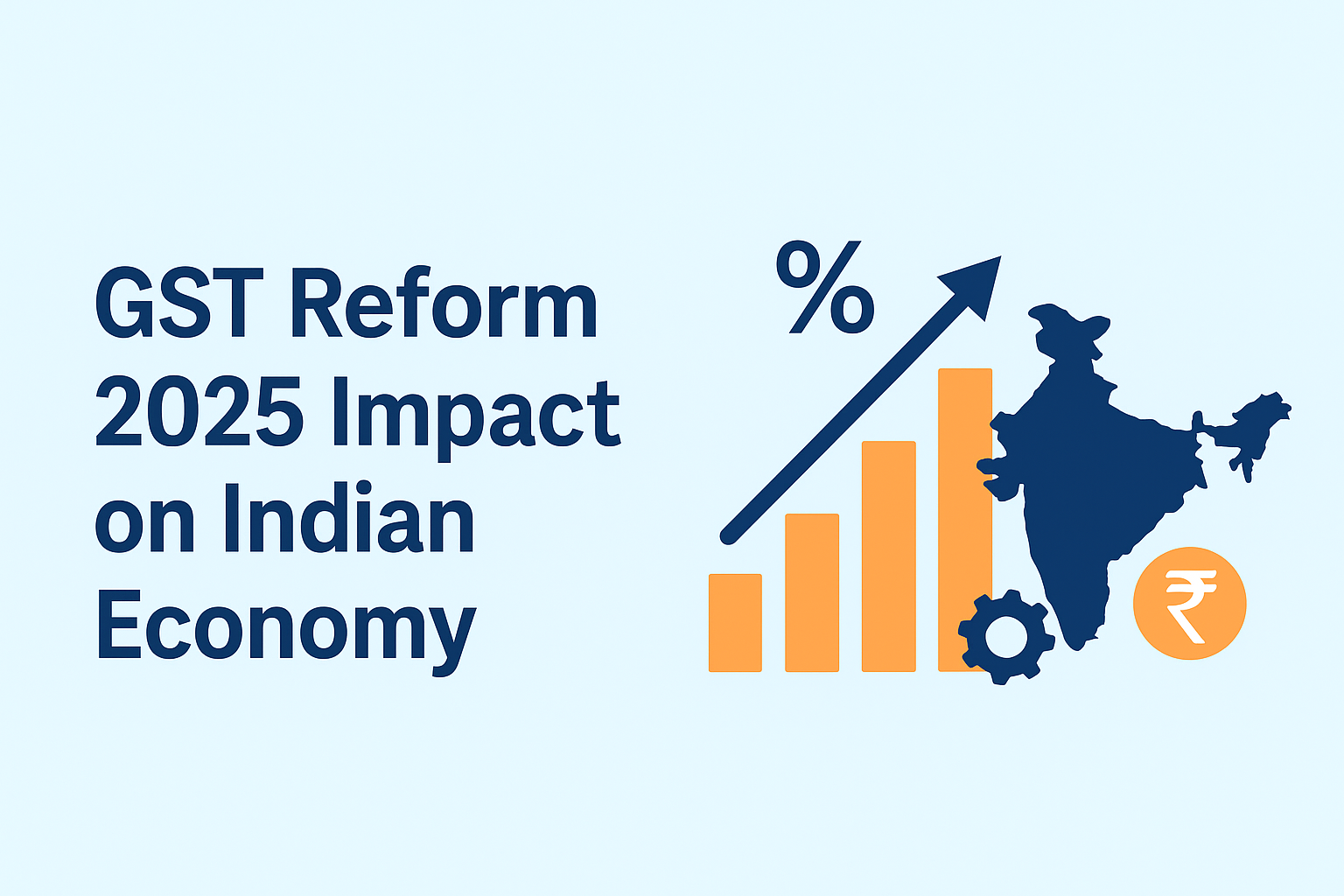GST reform 2025 effect on Indian economy is perhaps one of the most talked-about issues in finance and taxation this year. With the latest GST 2.0 update, policymakers believe they can make compliance with tax easier, improve transparency, and increase the ease of doing business. But what will be the effect of the reform on India’s economy and sectors in the years to come? Let’s dissect.
Understanding GST Reform 2025
The GST reform 2025 effect on Indian economy is closely interwoven with the government’s vision for a single tax system. As a continuation of the previous GST model, the GST 2.0 update is an attempt to simplify complexities for businesses.
The business impact of GST reform is seen already. By doing away with duplicate tax architecture, simplifying e-filing, and adding AI-based compliance mechanisms, the reform aims to save time as well as expense.
For tax payers, GST 2.0 update offers easy return filing methods, real-time matching of invoices, and quicker claims of input credits.
GST Reform 2025 Impact on Indian Economy: Growth and Opportunities
The impact of GST reform 2025 on Indian economy can be observed across various sectors:
- Increased Tax Compliance → Companies are now more transparent thanks to digital filing and AI-led audits.
- Boost to Small Businesses → Easy GST rates boost startups and MSMEs into the formal economy.
- Revenue Growth for Government → Improved compliance translates into increased tax collection, making India’s fiscal position stronger.
- Ease of Doing Business → India’s international ranking enhances with the GST 2.0 update as it makes taxation investor-friendly.
This clearly indicates the GST reform impact on business will go beyond adherence to long-term profitability and growth.
GST Reform Impact on Business in Various Sectors
Manufacturing Sector
The GST reform impact on business in manufacturing is predominantly beneficial. The GST 2.0 update eliminates several cascading taxes, which lower the expense for producers as well as consumers.
E-Commerce Sector
For e-commerce vendors, the GST reform 2025 effect on Indian economy entails easier interstate transactions, less paper work, and easy registration.
Export and Import Businesses
The GST 2.0 update enables faster refund systems, increasing the competitiveness of Indian exporters. This reform enhances India’s trade status in the world.
Startups and MSMEs
The GST reform effect on business among MSME companies is vital. With easier compliance rules and lower tax rates, small firms will be able to spend more time growing rather than complying.
Challenges of GST 2.0 Update
Although the GST reform 2025 effect on Indian economy is generally positive, there are challenges:
- Taking advantage of the new compliance framework needs training and digital preparedness.
- Small businessmen can initially experience difficulties in adapting to reforms.
- Older filing transition to the GST 2.0 update might result in short-term interruptions.
Nonetheless, the long-term advantages surpass these problems.
Comparison of GST 2.0 Update to Previous Reforms
The GST 2.0 update offers various enhancements over the initial GST launch:
- Accelerated return filing mechanisms.
- AI-driven fraud detection.
- Combination with digital payment gateways.
- Improved transparency to the taxpayer.
GST reform effect on business through the new scheme is more smooth compared to previous phases, decreasing compliance costs.
Why GST Reform 2025 is Important for Indian Economy
GST reform 2025 effects on Indian economy extend beyond companies. It consolidates India’s economic base, induces FDI, and promotes Make in India projects.
Moreover, improved compliance from the GST 2.0 release enables the government to invest more money in infrastructure, healthcare, and education. This is a growth cycle that reaches citizens directly.
Global Outlook for GST Reform 2025
Global investors keenly observe GST reform 2025 effect on the Indian economy. Through complying with international taxation standards, India is becoming a central destination for trade and technology investment.
That is also where Nextgenius, a source of latest tech news, points out the ways through which digital tax systems make India approach a globally connected digital economy.
Future of GST Reforms Beyond 2025
In the future, the GST reform business impact will further be changing. Potential trends are:
- Predictive taxation through AI.
- Further automation of compliances.
- Interoperability with blockchain for transparency.
- Extension of the GST 2.0 update to include new-generation digital firms such as crypto and gig economy platforms.
These changes will keep the GST reform 2025 Indian economy impact long-lasting.
Conclusion: GST Reform 2025 Impact on Indian Economy
The GST reform 2025 effect on Indian economy is revolutionary. Through simplification of taxation, enhanced compliance, and supporting business growth, the GST 2.0 upgrade is an advance toward economic resilience.
The GST reform effect on business is evident through manufacturing, e-commerce, MSMEs, and exports, making India a stronger and more competitive economy. Challenges are there, but the overall trend is positive and growth-oriented.
As companies evolve, monitoring recent tech news on Nextgenius will be essential to learning how digital transformation drives taxation reforms.
Short answer: the GST 2.0 patch isn’t simply a tax reform—it’s an engine for India’s economic future.
Need more guidance in Finance related terms Visit CreditMist



